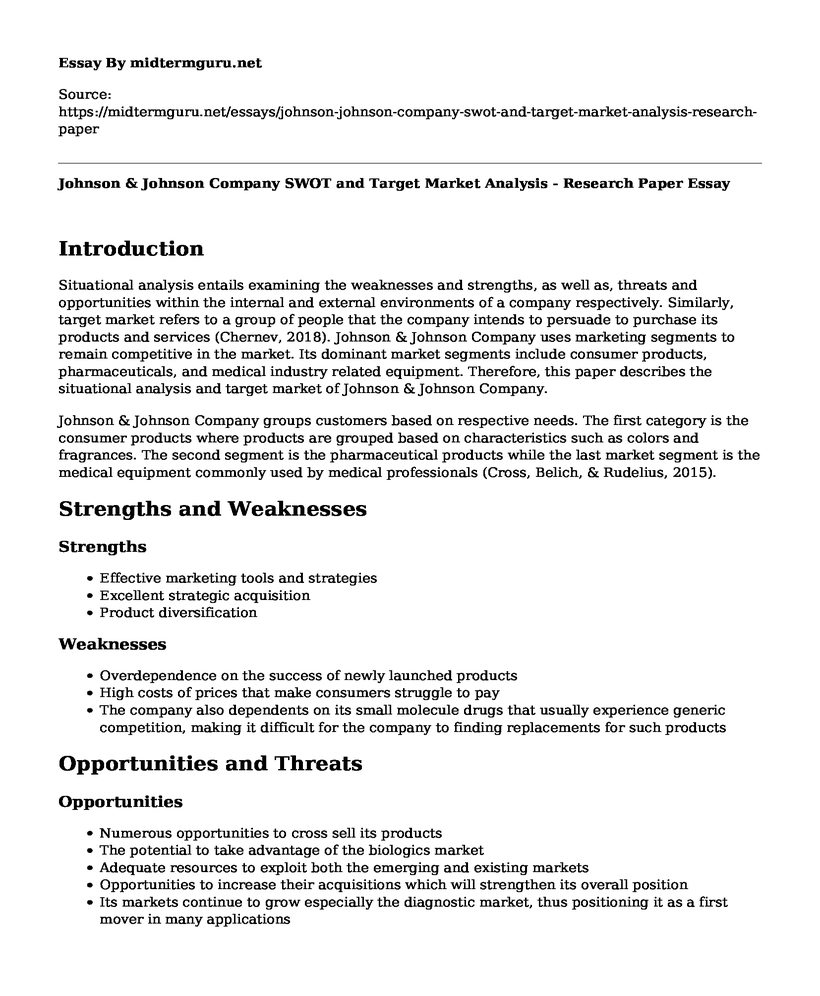Introduction
Situational analysis entails examining the weaknesses and strengths, as well as, threats and opportunities within the internal and external environments of a company respectively. Similarly, target market refers to a group of people that the company intends to persuade to purchase its products and services (Chernev, 2018). Johnson & Johnson Company uses marketing segments to remain competitive in the market. Its dominant market segments include consumer products, pharmaceuticals, and medical industry related equipment. Therefore, this paper describes the situational analysis and target market of Johnson & Johnson Company.
Johnson & Johnson Company groups customers based on respective needs. The first category is the consumer products where products are grouped based on characteristics such as colors and fragrances. The second segment is the pharmaceutical products while the last market segment is the medical equipment commonly used by medical professionals (Cross, Belich, & Rudelius, 2015).
Strengths and Weaknesses
Strengths
- Effective marketing tools and strategies
- Excellent strategic acquisition
- Product diversification
Weaknesses
- Overdependence on the success of newly launched products
- High costs of prices that make consumers struggle to pay
- The company also dependents on its small molecule drugs that usually experience generic competition, making it difficult for the company to finding replacements for such products
Opportunities and Threats
Opportunities
- Numerous opportunities to cross sell its products
- The potential to take advantage of the biologics market
- Adequate resources to exploit both the emerging and existing markets
- Opportunities to increase their acquisitions which will strengthen its overall position
- Its markets continue to grow especially the diagnostic market, thus positioning it as a first mover in many applications
Threats
- Its over-reliance on the success of the already launched products that are fragile when it comes to regulatory review
- The company has suffered misfortunes of having to recall most of the products thus lowering its image and reputation
- Better research and development of competitors pose a threat to the company
- Healthcare regulations are likely to make the company incur losses due to restrictions
- Stiff competition from generic based companies
Growth Opportunities
Johnson & Johnson Company can maximize its competitiveness in the pharmaceutical segment that contributes to about 37.7% of its revenue. Gurel and Tat (2017) noted that the company's dominance in the pharmaceutical segment provides it with a chance to highly price its products, thus rapid growth and higher profit margins.
The baby boomers in the US also presents a growth opportunity for the company to grow as the elderly require more medical attention compared to children. This according to Jaber, Elkarmi, Alasis, and Kostas (2015) implies that the company will experience growth in its profit margins because of the constant services and products it offers to the elderly.
More importantly, the company has the opportunity to explore acquisitions within the drug space. The acquisition will enable Johnson & Johnson to continue to take over the markets and customer bases for the small- and middle size drug manufacturers. Through the acquisition, the company will also have a competitive edge over competitors in terms of medicinal discoveries and improvements (Phadermrod, Crowder, & Wills, 2019).
Conclusion
In conclusion, conducting a situational analysis and understanding its market segments has helped Johnson & Johnson Company to remain competitive in the industry. The market segmentation has also enabled the firm to conduct market research to understand the needs of its customers thus produce its products based on such demands.
References
Chernev, A. (2018). Strategic marketing management. Michigan: Cerebellum Press.
Cross, J. C., Belich, T. J., & Rudelius, W. (2015). How marketing managers use market segmentation: An exploratory study. In Proceedings of the 1990 Academy of Marketing Science (AMS) Annual Conference (pp. 531-536). Springer, Cham.
Gurel, E., & Tat, M. (2017). SWOT Analysis: A theoretical review. Journal of International Social Research, 10(51).
Jaber, J. O., Elkarmi, F., Alasis, E., & Kostas, A. (2015). Employment of renewable energy in Jordan: Current status, SWOT and problem analysis. Renewable and Sustainable Energy Reviews, 49, 490-499.
Phadermrod, B., Crowder, R. M., & Wills, G. B. (2019). Importance-performance analysis-based SWOT analysis. International Journal of Information Management, 44, 194-203.
Cite this page
Johnson & Johnson Company SWOT and Target Market Analysis - Research Paper. (2022, Dec 21). Retrieved from https://midtermguru.com/essays/johnson-johnson-company-swot-and-target-market-analysis-research-paper
If you are the original author of this essay and no longer wish to have it published on the midtermguru.com website, please click below to request its removal:
- Essay on Television Show and a Consumer Product
- The Nike Issue - Paper Example
- Paper Example on Supply Chain Management
- Executive Dashboards: Measuring Firm Performance and Gaining Competitive Edge - Essay Sample
- Reviewing Forms for Compliance: Frequency & Preparedness - Essay Sample
- High Employee Turnover: Solutions for Organizations - Essay Sample
- Periodic Changes in Purchases & Supplies Impact Professionalism - Essay Sample







